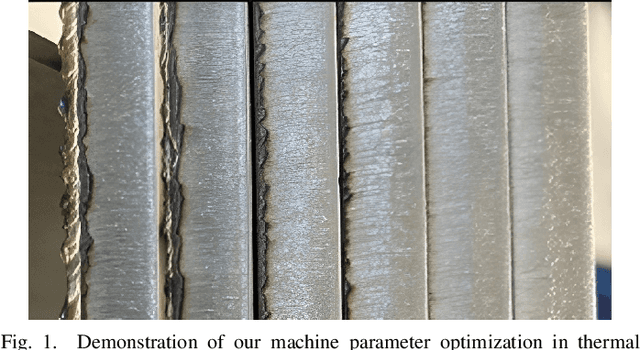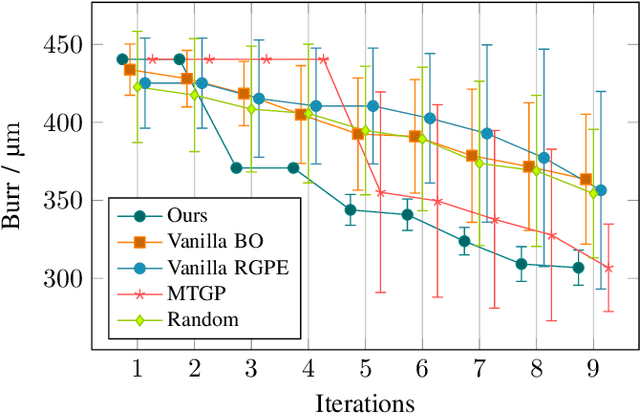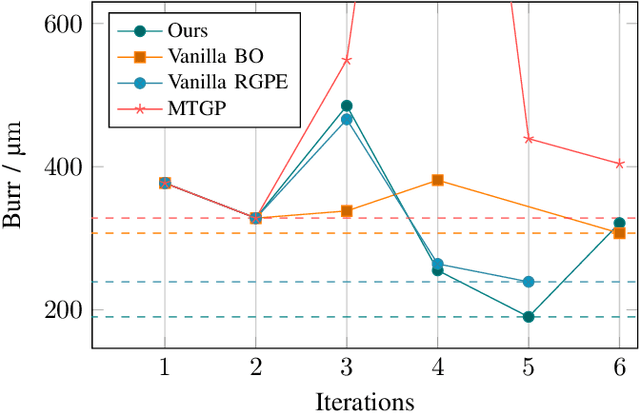Philipp Wagner
Sample-Efficient Bayesian Transfer Learning for Online Machine Parameter Optimization
Mar 21, 2025



Abstract:Correctly setting the parameters of a production machine is essential to improve product quality, increase efficiency, and reduce production costs while also supporting sustainability goals. Identifying optimal parameters involves an iterative process of producing an object and evaluating its quality. Minimizing the number of iterations is, therefore, desirable to reduce the costs associated with unsuccessful attempts. This work introduces a method to optimize the machine parameters in the system itself using a Bayesian optimization algorithm. By leveraging existing machine data, we use a transfer learning approach in order to identify an optimum with minimal iterations, resulting in a cost-effective transfer learning algorithm. We validate our approach on a laser machine for cutting sheet metal in the real world.
Audio-based Step-count Estimation for Running -- Windowing and Neural Network Baselines
Jun 10, 2024Abstract:In recent decades, running has become an increasingly popular pastime activity due to its accessibility, ease of practice, and anticipated health benefits. However, the risk of running-related injuries is substantial for runners of different experience levels. Several common forms of injuries result from overuse -- extending beyond the recommended running time and intensity. Recently, audio-based tracking has emerged as yet another modality for monitoring running behaviour and performance, with previous studies largely concentrating on predicting runner fatigue. In this work, we investigate audio-based step count estimation during outdoor running, achieving a mean absolute error of 1.098 in window-based step-count differences and a Pearson correlation coefficient of 0.479 when predicting the number of steps in a 5-second window of audio. Our work thus showcases the feasibility of audio-based monitoring for estimating important physiological variables and lays the foundations for further utilising audio sensors for a more thorough characterisation of runner behaviour.
Model Reporting for Certifiable AI: A Proposal from Merging EU Regulation into AI Development
Jul 21, 2023

Abstract:Despite large progress in Explainable and Safe AI, practitioners suffer from a lack of regulation and standards for AI safety. In this work we merge recent regulation efforts by the European Union and first proposals for AI guidelines with recent trends in research: data and model cards. We propose the use of standardized cards to document AI applications throughout the development process. Our main contribution is the introduction of use-case and operation cards, along with updates for data and model cards to cope with regulatory requirements. We reference both recent research as well as the source of the regulation in our cards and provide references to additional support material and toolboxes whenever possible. The goal is to design cards that help practitioners develop safe AI systems throughout the development process, while enabling efficient third-party auditing of AI applications, being easy to understand, and building trust in the system. Our work incorporates insights from interviews with certification experts as well as developers and individuals working with the developed AI applications.
Kalman Bayesian Neural Networks for Closed-form Online Learning
Oct 03, 2021



Abstract:Compared to point estimates calculated by standard neural networks, Bayesian neural networks (BNN) provide probability distributions over the output predictions and model parameters, i.e., the weights. Training the weight distribution of a BNN, however, is more involved due to the intractability of the underlying Bayesian inference problem and thus, requires efficient approximations. In this paper, we propose a novel approach for BNN learning via closed-form Bayesian inference. For this purpose, the calculation of the predictive distribution of the output and the update of the weight distribution are treated as Bayesian filtering and smoothing problems, where the weights are modeled as Gaussian random variables. This allows closed-form expressions for training the network's parameters in a sequential/online fashion without gradient descent. We demonstrate our method on several UCI datasets and compare it to the state of the art.
 Add to Chrome
Add to Chrome Add to Firefox
Add to Firefox Add to Edge
Add to Edge